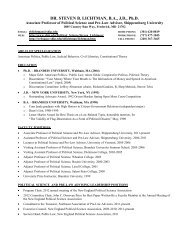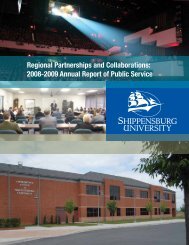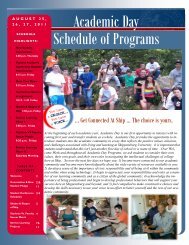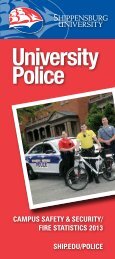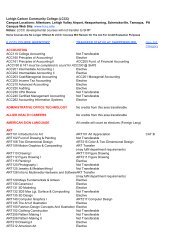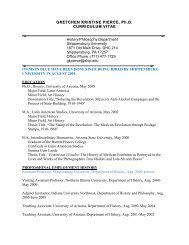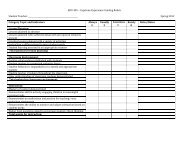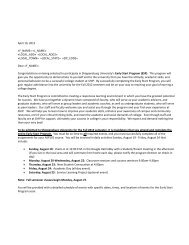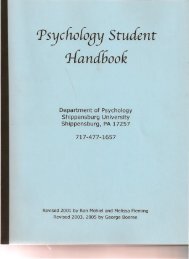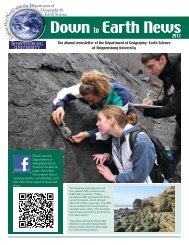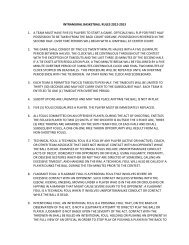Complete Issue - Shippensburg University
Complete Issue - Shippensburg University
Complete Issue - Shippensburg University
- No tags were found...
Create successful ePaper yourself
Turn your PDF publications into a flip-book with our unique Google optimized e-Paper software.
Beatrice Marelli: Irrigation Systems and Values 35ENDNOTES1. From the comment of one member: “There is no problem. Weface the same situation every year and, in any case, we can haveanother well. I do not see so much urgency. There is no crisisregarding water, overall here.”2. “I do not trust anyone else than the members of my family.Why should I trust them?” (one member of Farfenga referred tothe board of representatives).3. From the words of one past leader of Gabbiana: “I trust them,why should not they trust me? I really think all of them arehonest. I treat themselves as I am used to behave with myself.They are all friends to me and I hope I am considered a friend bythem.”4. From the words of a former secretary: “It is sometimes difficultto make an agreement that could be good for everybody, but theonly way is speaking with people, the dialogue, and make thatthey could understand that there is something that is good for all.I cannot count how many kilometers I did going from one ranchto another one, but once obtained the agreement all is okay, isover, and I am happy, even if it has been hard to make.”5. From the words of the current secretary of the consortium.REFERENCESAgrawal, Arun and Clark Gibson, eds. 2001. Communities andthe environment: Ethnicity, gender, and the state incommunity-based conservation. New Brunswick: Rutgers<strong>University</strong> Press.Boudon, Raymond. 1997. Il vero e il giusto. Saggi sull’obiettivitàdei valori e della conoscenza. Milano: Il Mulino.———. 2000. Il senso dei valori. Milano: Il Mulino.———. 2002. Sentimenti di giustizia. Milano: Il Mulino.———. 2003. Declino della morale? Declino dei valori? Milano: IlMulinoBoulding, Kenneth E. 1968. Beyond economics: Essays onsociety, religion, and ethics. MI: Univ. of Michigan Press.Cardenas, J.C. 2000. How do groups solve local commonsdilemmas? Lessons from experimental economics in thefield. Environment, Development and Sustainability, 2:305-322.Cella, Gian Primo. 1994. Non di solo mercato. Roma: Origami.———. 1997. Le tre forme dello scambio. Bologna: Il Mulino.Dasgupta, P.S. 1997. Economic development and the idea ofsocial capital. Working Paper. Faculty of Economics,<strong>University</strong> of Cambridge.Elster, Jon. 1992. Local justice: How institutions allocate scarcegoods and necessary burdens. New York: Russell SageFoundation.———. 1993. Come si studia la società. Una “cassetta degliattrezzi per le scienze sociali”. Bologna: Il Mulino.———. 1995. Il cemento della società. Uno studio sull’ordinesociale. Bologna: Il Mulino.Frey, Bruno S. 1997. Not just for the money: An economic theoryof personal motivation. Cheltenham: Edward Elgar.Gambetta, Diego, ed. 1988. Trust: Making and breakingcooperative relations. Oxford: Basil Blackwell.Hardin, G. 1968. The tragedy of the commons. Science.162(3859): 1243-1248.Hardin, Russell. 1988. Morality within the limits of reason.Chicago: <strong>University</strong> of Chicago Press.Hirsch, Fred. Social limits to growth, London: Routledge.Kreps, D. 1990. Corporate culture and economic theory. InPerspectives on Positive Political Economy, ed. J. E. Altand K. Shepsle, New York:Cambridge <strong>University</strong> Press.Marshall Graham, 2005. Economics for collaborativeenvironmental management: Renegotiating the commons.London: Earthscan.Ostrom, Elinor. 1990. Governing the commons: The evolution ofinstitutions for collective action. New York: Cambridge<strong>University</strong> Press.———. 1992. Crafting institutions for self-governing irrigationsystem. San Francisco: ICS Press.———. 1998. A behavioural approach to the rational choicetheory of collective action, American Political ScienceReview. 92(1):1-22.———. 1999. Institutional rational choice: An assessment of theIAD framework. In Theories of the Policy Process, ed. P.A.Sabatier, Boulder: Westview Press.———. 2005. Understanding institutional diversity. Princeton:Princeton <strong>University</strong> Press.Ostrom E. and Ahn T.K. 2008. The meaning of social capital andits link to collective action. In Handbook on social capital,eds. G.T. Svendsen and G.L. Svendsen, Northhampton:Edward Elgar.Ostrom Elinor and James Walker, eds. 2003. Trust andreciprocity: Interdiscipinary lessons from experimentalreseach. New York: Russell Sage Foundation.Ostrom, V. 1980. Artisanship and artifact. Public AdministrationReview. 40(4):309-317.Putnam, Robert. 1993. Making democracy work: Civic traditionsin modern Italy. Princeton: Princeton <strong>University</strong> Press.North, Douglass. 1990. Institutions, institutional change andeconomic performance, Cambridge: Cambridge <strong>University</strong>Press.Repetto, R. 1986. Skimming the water: Rent-seeking and theperformance of public irrigation systems. Research Reportn.41, World Resource Institute: Washington D.C.Simon, Herbert. 1947. Administrative behavior, New York:McMillan.Sugden, Robert. 1986. The economics of rights, co-operation,and welfare. Oxford: Blackwell.



